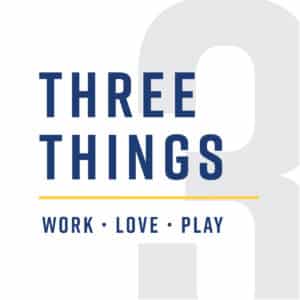Three Things
The Office of Student Life is pleased to share an encouraging word from University Counselor Jerry Leslie regarding healthy balance in our lives. We hope you find it helpful!

There are three things that every person has to do while living in this world. What do you think the three most important things that people must do as long as they are living?
American psychologist Abraham Maslow developed a “Hierarchy of Needs” where he posited man must satisfy his physiological needs first, and ultimately reach a state of self-actualization. Many other developmental theories have been presented over millennia and each have some viable ideas. But, they can all be somewhat complex and complicated. While life is both it can be simplified for practical purposes. I would suggest to you the idea of three things that must be done by each person. Some people will do them well, others will not. I would encourage you to consider how well you are doing life based upon this simple model of three things.
Imagine three circles. In one circle write, WORK. In another circle write, LOVE. In the third circle write, PLAY. At this point the circles are separate from each other. The WORK circle contains ideas and elements describing the needs a person has for productivity, usefulness and accomplishment. The LOVE circle contains ideas and elements for describing a person’s needs for relationship, community, bonding, emotions and identity. The third circle, PLAY, contains ideas and elements of recreation, recharging of body and spirit, relaxation, the absence of emotional or physical over-stress.
It is possible for a person to spend more or less time in each of the three arenas. In fact, most people will do just that … spend an unbalanced amount of time in one of the circles to the exclusion of the other two. A person may WORK too much, LOVE too much, or PLAY too much. Balance is the key concept we are looking for in doing life well.
Now arrange the circles so they partially overlap. It is possible to overlap two of the circles and leave one out. It is possible that the circles could be overlapping but still not equally. For instance, the WORK circle could dominate in appearance leaving little room for LOVE and/or PLAY (think of a workaholic). Or, PLAY could dominate the appearance of the three conjoined circles to the deference of WORK and LOVE (think of the person who plays golf every free minute of every day). Even LOVE can dominate the other two circles (think of the person who lives on social media or is constantly in and out of relationships). Again, balance is the primary goal.
Our present dilemma of COVID-19 brings into play a revisiting of how we are to address this need for balance in WORK, LOVE and PLAY. This is especially difficult considering the need to distance ourselves physically from one another. We may not be able to obtain our daily quota for physical touches or hugs, handshakes, etc. In 1987 AT&T aired on television a college student calling home (on his landline!) just to catch up on things with his family (see on YouTube, “Reach out and touch someone”). It was a beautiful example of the need for connection, for love, for reassurance.
We must continue to WORK, PLAY and LOVE but in a different way. We must be flexible and adapt for a while. The worst thing we can do is surrender to the virus and isolate ourselves, stop working and being productive as students or employees and stop being connected, bonded to and emotionally nurtured by others.
God created us to WORK, LOVE and PLAY. Don’t let this temporary virus and the necessary changes in our routines lessen our doing life well. Do your job, talk to someone, stay mobile, be patient. This too shall pass.
Jerry Leslie, M.MFT, LPC-S, LMFT, LCDC
HPU University Counselor
Office of Student Life
Howard Payne University
1000 Fisk Street
Brownwood, TX 76801
(325) 649-8017
slife@hputx.edu
Mabee University Center – 2nd Floor